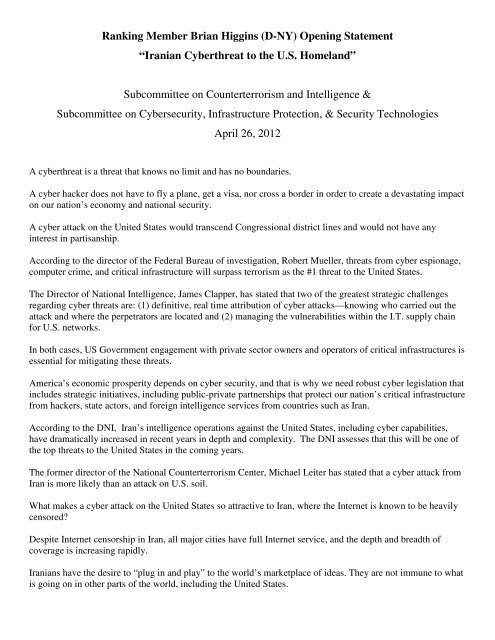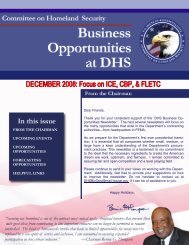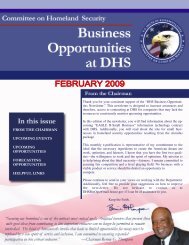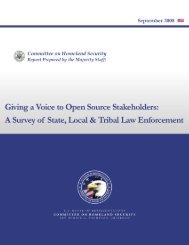Opening Statement - Committee on Homeland Security
Opening Statement - Committee on Homeland Security
Opening Statement - Committee on Homeland Security
You also want an ePaper? Increase the reach of your titles
YUMPU automatically turns print PDFs into web optimized ePapers that Google loves.
Ranking Member Brian Higgins (D-NY) <str<strong>on</strong>g>Opening</str<strong>on</strong>g> <str<strong>on</strong>g>Statement</str<strong>on</strong>g>“Iranian Cyberthreat to the U.S. <strong>Homeland</strong>”Subcommittee <strong>on</strong> Counterterrorism and Intelligence &Subcommittee <strong>on</strong> Cybersecurity, Infrastructure Protecti<strong>on</strong>, & <strong>Security</strong> TechnologiesApril 26, 2012A cyberthreat is a threat that knows no limit and has no boundaries.A cyber hacker does not have to fly a plane, get a visa, nor cross a border in order to create a devastating impact<strong>on</strong> our nati<strong>on</strong>’s ec<strong>on</strong>omy and nati<strong>on</strong>al security.A cyber attack <strong>on</strong> the United States would transcend C<strong>on</strong>gressi<strong>on</strong>al district lines and would not have anyinterest in partisanship.According to the director of the Federal Bureau of investigati<strong>on</strong>, Robert Mueller, threats from cyber espi<strong>on</strong>age,computer crime, and critical infrastructure will surpass terrorism as the #1 threat to the United States.The Director of Nati<strong>on</strong>al Intelligence, James Clapper, has stated that two of the greatest strategic challengesregarding cyber threats are: (1) definitive, real time attributi<strong>on</strong> of cyber attacks—knowing who carried out theattack and where the perpetrators are located and (2) managing the vulnerabilities within the I.T. supply chainfor U.S. networks.In both cases, US Government engagement with private sector owners and operators of critical infrastructures isessential for mitigating these threats.America’s ec<strong>on</strong>omic prosperity depends <strong>on</strong> cyber security, and that is why we need robust cyber legislati<strong>on</strong> thatincludes strategic initiatives, including public-private partnerships that protect our nati<strong>on</strong>’s critical infrastructurefrom hackers, state actors, and foreign intelligence services from countries such as Iran.According to the DNI, Iran’s intelligence operati<strong>on</strong>s against the United States, including cyber capabilities,have dramatically increased in recent years in depth and complexity. The DNI assesses that this will be <strong>on</strong>e ofthe top threats to the United States in the coming years.The former director of the Nati<strong>on</strong>al Counterterrorism Center, Michael Leiter has stated that a cyber attack fromIran is more likely than an attack <strong>on</strong> U.S. soil.What makes a cyber attack <strong>on</strong> the United States so attractive to Iran, where the Internet is known to be heavilycensored?Despite Internet censorship in Iran, all major cities have full Internet service, and the depth and breadth ofcoverage is increasing rapidly.Iranians have the desire to “plug in and play” to the world’s marketplace of ideas. They are not immune to whatis going <strong>on</strong> in other parts of the world, including the United States.
So what would motivate a cyber attack?Would Iran’s ec<strong>on</strong>omic disc<strong>on</strong>nect from the financial world be an attracti<strong>on</strong> to gauge a cyber attack againstfinancial instituti<strong>on</strong>s?We know Iran’s history of carrying out attacks via proxies. Does the ease of finding proxies to c<strong>on</strong>duct cyberattacks make Iran more susceptible to carrying out a cyber attack than a kinetic <strong>on</strong>e?How can we know if the United States is prepared to handle a cyber threat from Iran?Are our efforts str<strong>on</strong>g enough? Do we need to require a government agency to give us updates <strong>on</strong> thetechnological advances that Iran is making with regard to cyber intrusi<strong>on</strong>s?I, al<strong>on</strong>g with C<strong>on</strong>gressman Duncan, who sits <strong>on</strong> this panel, have co sp<strong>on</strong>sored a bipartisan bill that wouldrequire the State Department to provide updates <strong>on</strong> Iran’s technological capabilities. Would that be helpful?Although these are questi<strong>on</strong>s to which our witnesses can lend their thoughts, I would like to ask that theSubcommittee hold a classified Member Briefing to receive an update from the Intelligence Community <strong>on</strong> theIranian cyberthreat so we can gain more understanding of what we face.While the IC is not here to give us the specifics <strong>on</strong> the Iranian cyber threats, which would be inappropriate forthis open setting. I would like to c<strong>on</strong>centrate <strong>on</strong> what we know.We know that Iran poses a threat to our cybersecurity. We also know that our informati<strong>on</strong> technologies havemassive vulnerabilities. We know that our dependence <strong>on</strong> technology is growing exp<strong>on</strong>entially by the day.We know that our moving forward as a nati<strong>on</strong> depends <strong>on</strong> our having a robust, comprehensive cybersecuritypolicy in place.Therefore, we must have legislati<strong>on</strong> and policies that not <strong>on</strong>ly examine the threat, but also protect criticalinfrastructure and promote research and development that will ensure that we have the proper protocols in placeto prevent a cyber attack.








